Why the New York Knicks have won the hearts of Jewish New York — and basketball lovers everywhere
The 2024 squad is a throwback to an earlier era
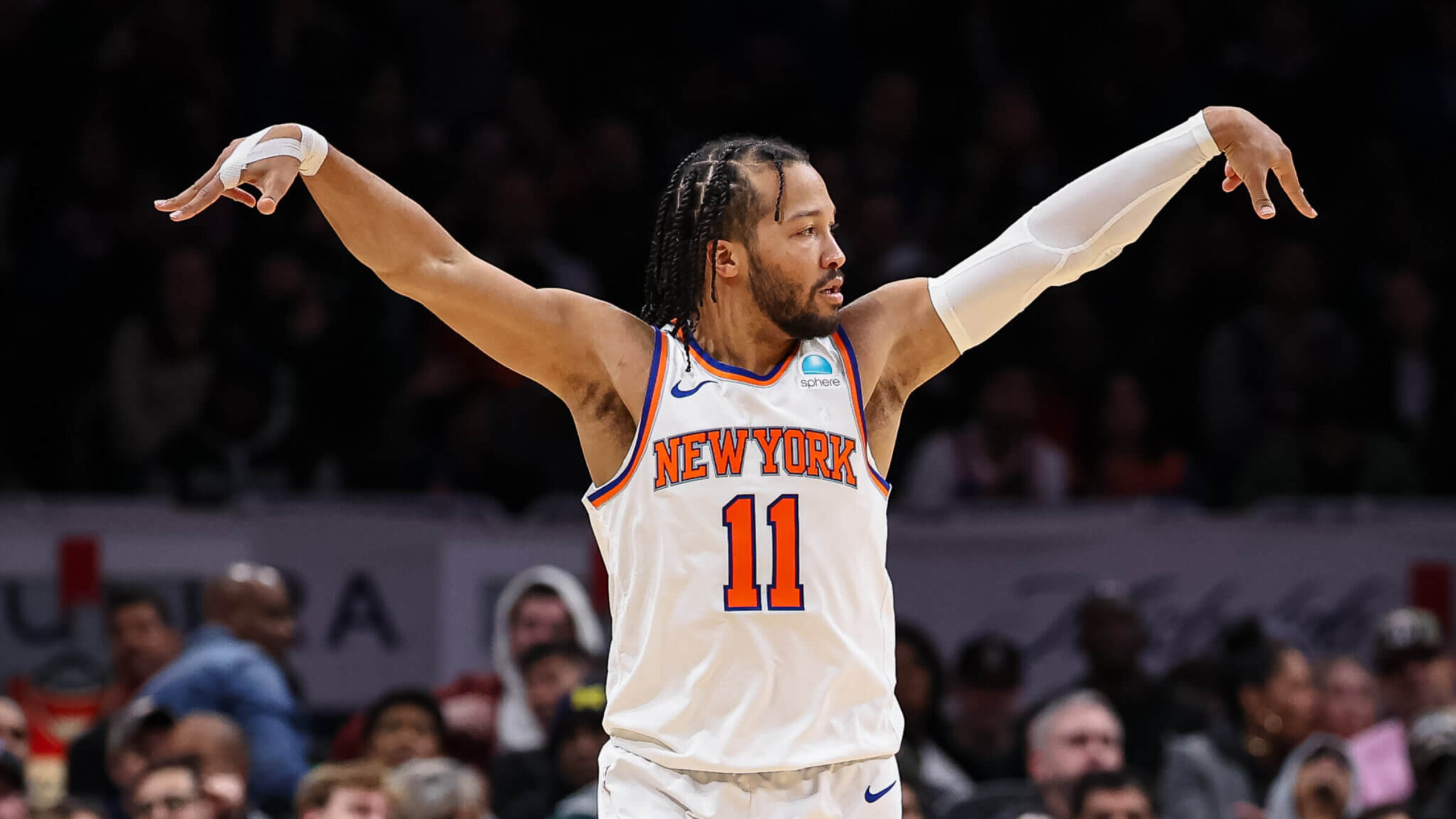
Jalen Brunson celebrates after making a three point basket. Photo by Getty Images
“There’s a strong correlation between Judaism and Knicks basketball,” Josh Safdie, co-director of Uncut Gems once said. “And it has to do with suffering and trying to understand your life.”
As the Israeli-Hamas war continues to rage and antisemitism has reached a fever pitch, the state of the global union can seem overwhelming and genuinely depressing. Particularly in New York City, where life at Columbia University, along with dozens of other colleges nationwide, has been marked by civil unrest, violence, bigotry, armed police and arrests, reminiscent of life during the 1960s and 70s.
Luckily, something far more inspiring, light-hearted, and joyous, is playing out in parallel in New York. The New York Knicks — Go New York, Go New York Go! — are enjoying a truly magical, renaissance season, having now advanced to the second round of the NBA playoffs for the second year in a row, after winning a grueling and exhilarating series in six games over longtime rival the Philadelphia 76ers.
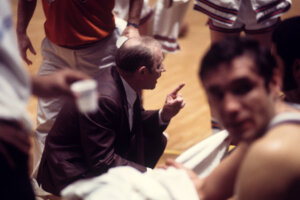
With due respect and homage to the New York Rangers (vying for the team’s first Stanley Cup since 1994), and the New York Yankees (and Mets), the Knicks have once again, arguably for the first time in at least 25 years, captured the heart and soul of the city and its sports fans. This Knick squad is at its essence a throwback to a simpler era — the Pat Riley, Jeff Van Gundy, and Patrick Ewing Knicks of the 1990s. The current team’s DNA consists of grit, resilience, and a tireless, blue-collar work ethic and pride that fans (including this one) adore and truly love.
“All-in,” Knick fandom in the heart of NYC — at the Mecca, the world’s most famous arena, Madison Square Garden — is exactly the sort of “run to the light” sports and entertainment respite and escapism from the darkness and pain of world events that we all can lean into proudly and happily even if for just a few hours. As the Knicks pursue their quest for their third NBA championship, falling in love with these players, cheering for them, screaming at their mistakes, and investing time and deep passion in them is quite the welcome distraction — much like the return of Yankees and Mets baseball in New York not long after the 9/11 terror attacks on the World Trade Center.
Fifty plus years removed from the Knicks’ last NBA championship, life as a Knick fan, has been a legitimately torturous exercise in physical, mental, emotional, and yes, spiritual pain and suffering of the highest order of magnitude. Adam Sandler, who in Uncut Gems starred as a stereotypical Jewish New York dealer in the jewelry district, as well as a degenerative gambler on all things NBA, has become one of the most ardent, celebrity-row Knick fans this side of Spike Lee, and a real hoops aficionado. But whether you are Sandler sitting courtside, or a regular Joe sitting at home screaming at the television, the feeling of nail-biting, stress and gut-wrenching suffering is identical — we suffer with our team and seek answers about our own lives while pursing our version of utopia where “we” win the NBA title.
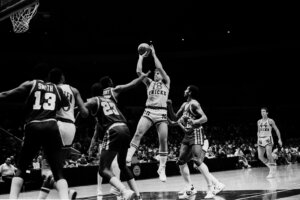
The last time the beloved Knicks won an NBA championship, their leader was none other than coach William “Red” Holzman. Holzman, who served in the Navy during World War II, was at the helm for the only two Knick titles in franchise history (1969-70 and 1972-73). He is generally considered the most important and greatest coach in Knicks history.
Holzman, born to Jewish immigrant parents in 1920, is also one of a few Jewish men to have the cool distinction of winning the NBA title as both a player and coach. He is an NBA Hall of Famer whose number of career Knicks’ coaching victories (613) hangs from the rafters at The Garden along with the jerseys of those legendary players that he led to the title including Walt “Clyde ” Frazier, “The Captain,” Willis Reed, “Dollar Bill” Bradley, Earl “The Pearl” Monroe, and Dave Debusschere.
In 1988, Holzman was inducted into the International Jewish Hall of Fame (formally established in Israel in July 1981). Also there is another legendary Jewish NBA coach and executive, one Arnold Jacob “Red” Auerbach, of Boston Celtic fame, who in addition to his extraordinary success in the NBA, is often seen as a social justice trailblazer, credited with helping to dismantle prejudices and racial segregation in the NBA. Nomad, vagabond, one-time Knick coach and NBA Hall of Famer Larry Brown (who was a successful NBA and ABA player), is also a part of this legendary Hall of Fame coaching fraternity (although sadly not so much for his tenure with the Knicks — his New York coaching career of one season was an unmitigated disaster for the franchise during the years of pain under the GM leadership of one Isiah Thomas!).
Because any Knicks history tour usually begins with the Red Holzman championship Knicks, it might be natural for one to assume that the Knicks’ only real connection to Jewish history starts and stops with Red. Not so. In a league where very few players are in fact Jewish (indeed the Knicks teams Red led had no Jewish players, and in 2024 there is literally only one player who is Jewish which seems insane as I write it), the Knicks as a franchise have a unique and pioneering Jewish history, pre-dating Red by a few decades. In 1946, the New York Knickerbockers (very few still call them by that name anymore), one of the NBA’s inaugural franchises, fielded a roster that included six Jewish players. Back in the 40s and 50s, basketball, the Original City Game (as described by writer Michael Feldberg), was a pathway for low-income or poor and urban youth to assimilate into America, and this included American Jews.
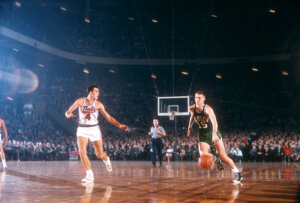
Nearly 80 years ago, on Nov. 1, 1946, the ‘Bockers defeated the Toronto Huskies in a 68-66 barnburner. What most people probably wouldn’t know is that on that day, Knick starter Oscar “Ossie” Schectman — one of four Jewish Knick starters along with Captain Leo “Ace” Goldstein (their leading scorer), Sidney “Sonny” Hertzberg (their captain) and Ralph Kaplowitz — would make NBA history. Schectman made the first shot of the game and became, fun fact, the first player to ever score in an NBA game. Yes, in a league that in the modern era especially has only seen a handful of Jewish players actively playing across many decades, it was a Jewish man who scored the very first NBA points ever.
The original Jewish Knick players, much like countless African American players who came before and after them (cutting across all the major sports), endured prejudice, slurs, bias and antisemitism. And, reportedly, the higher-ups of Knick management, fearful of backlash of having too many Jews on the roster, and the notion that so many Jews might somehow be bad for ticket sales, ultimately unloaded their star, Jewish players.
Arguably, the greatest Jewish superstar NBA player ever, was sadly, never a New York Knick. Dolph Schayes played in the 50s and was a born and bred New Yorker, who successfully plied his NBA craft for the once upon a time Syracuse Nationals, and became recognized as the only Jewish player ever to be selected to the NBA’s Top 50 players. His son Danny (Daniel) followed his dad’s footsteps into the NBA and carved out an 18-year career for seven different NBA franchises in the 80s and 90s.
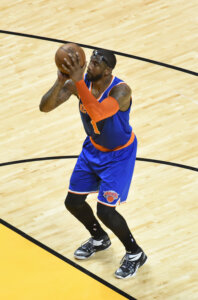
Knick fans would likely argue that, notwithstanding Dolph’s extraordinary NBA career, the actual greatest Jewish player ever was a New York Knick from 2010-2016, named Yahoshafat Ben Avraham. Back then, most people recognized him by his given name, Amar’e (Carsares Jehoshaphat) Stoudemire — or, by his nickname, STAT. Stoudemire’s basketball talent (he was, as an aside, pretty funny playing himself in the Amy Schumer, Bill Hader, LeBron James comedy classic, Trainwreck), placed him atop the best Jewish NBA players of all time leader board; unquestionably, he is the best Jewish player to lace up sneakers as a member of the Knicks (no disrespect to one Ernie Grunfeld, who prior to Stoudemire was likely the best Jewish Knick ever, and also marshaled an outstanding post-playing career as Knicks general manager during the glory days of the 1990s).
After the Knicks were spurned in 2010 free agency by the King, LeBron James (who took his talents to South Beach), Stoudemire, bad knees and all, signed as a free agent with the Knicks in 2010 and, in 2012, along with Carmelo Anthony, led the Knicks to the second round of the Eastern Conference finals where they lost in six to the Indiana Pacers (their 2024 second round opponent). That team was, prior to the current Knick group, the last time the Knicks were seen as modestly relevant, or as an NBA contender.
After retiring from the NBA, Stoudemire continued to play in Israel, winning a title with Hapoel Jerusalem (a team he now co-owns) in 2017. He also won a second title with Maccabi Tel Aviv in 2020 ,where he earned at age 38 the Israeli Basketball Premier League Finals MVP. His commitment to Judaism deepened, and he became an Israeli citizen in 2019, and formally converted to Judaism in 2020; he now lives his day-to-day life as an Orthodox Jew.
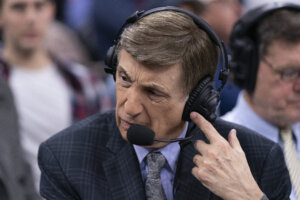
Still, it may not be a player (Stoudemire) or a coach (Holzman) or an executive (Grunfeld) who is the greatest symbol of Knicks Jewish history. No, it is likely the one and only broadcast voice of the Knicks for nearly 50 years, Mr. Marvin Aufrcichtig, more affectionately known to the Knick and NBA universe as the incomparable Marv Albert. Albert, now in his early 80s, was born to Jewish parents in Brooklyn and, as legend has it, got his early break as a neophyte fresh out of college in 1963, when another prominent Jewish broadcaster — Marty Glickman — had a conflict one day, and Albert got a shot to do the Knick game on radio. The rest is, as they say, history.
Albert became synonymous with Knicks basketball through the best and worst of Knicks times. He also became, arguably the most important sports broadcaster nationally for decades (he did not just work for the Knicks but also did national NBA and NHL and NFL telecasts, championship boxing, the Jets, the Rangers, the Giants, the Olympic 1992 Dream team, tennis, as well as his regular appearances on Letterman). Albert was also inducted into the National Jewish Sports Hall of Fame in 1993. His signature call “Yes!!!” is one that will live on forever.
May is Jewish-American Heritage month. With the Knicks bringing excitement, passion, and emotion to fans everywhere, this is a perfect moment in time to meaningfully spotlight this team’s Jewish history. Whether it be the original six Jewish players from the 1940s, their championship coach from the 70s, their legendary voice crossing the 60s through the early 2000s, their GM of the 1990s, or their future hall of famer from the 2010s, the Knicks’ connective tissue to Jewish history is unique in a sport where very few players for over eight decades have been Jewish.
Here’s hoping that this 2024 Knicks team’s quest for a championship can serve one and all as a beacon of hope in times of despair or suffering.
Yes!!!























